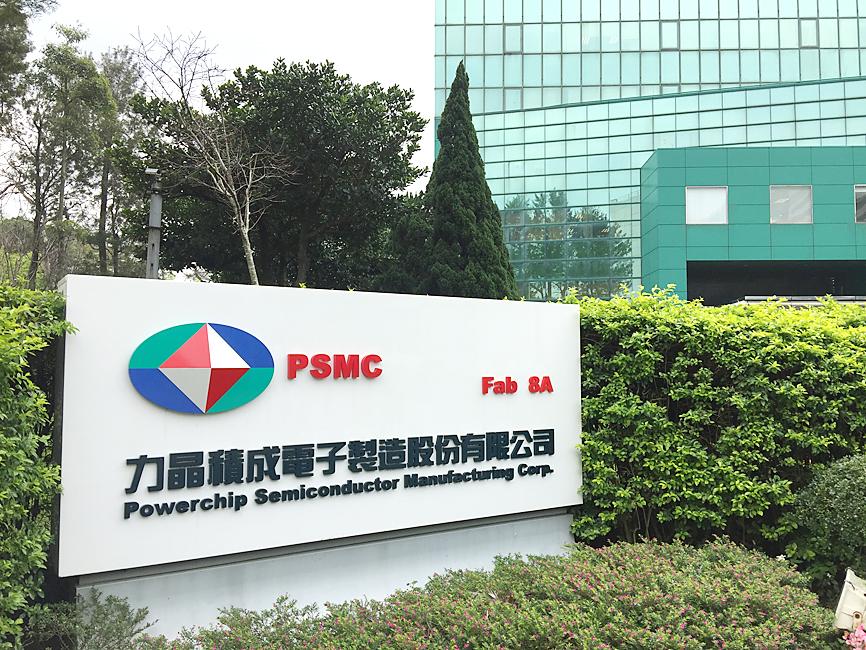Shares of Powerchip Semiconductor Manufacturing Corp (力積電), the world’s seventh-largest foundry, yesterday surged 223 percent on their first day on the Emerging Stock Board, boosting the company’s market capitalization to NT$260.8 billion (US$9.15 billion).
Powerchip’s market value surpassed that of its closest rival, Vanguard International Semiconductor Co (世界先進) valued at NT$210.8 billion, based on its share price of NT$128.5 yesterday.
Powerchip shares skyrocketed to touch NT$84 soon after the market opened in the morning, from the subscription price of NT$26 per share. The stock opened at NT$55.7.

Photo: Hung Yu-fang, Taipei Times
About 1.3 billion Powerchip shares changed hands, making it the most heavily traded stock on the board.
Last week, Powerchip gave an upbeat business outlook for this quarter and next year, saying that 8-inch capacity constraints have triggered panic among its customers. The company would raise prices to cope with capacity scarcity, it said.
As working from home, online learning and the stay-at-home economy stimulated demand for laptops and other devices, Powerchip said it has seen a spike in demand for display driver and power management ICs.
Its DRAM business is close to a breakeven level this quarter, the company added.
Powerchip’s revenue recovered to NT$3.98 billion in October, soaring 30.78 percent from NT$3.05 billion a year earlier. In the first 10 months of this year, revenue surged about 84 percent year-on-year to NT$37.79 billion from NT$20.56 billion.
Yuanta Investment Consulting Co (元大投顧) in a note ahead of Powerchip’s stock debut said that the foundry would next year benefit from 8-inch wafer capacity constraints, as it plans to expand its 8-inch wafer capacity by 20 percent and hike prices.
“We believe increases in average selling price and sales volume will be Powerchip’s major growth drivers in 2021,” Yuanta said on Tuesday.
Powerchip plans to raise prices by 5 percent to 10 percent next year, the note said.
Rising demand for power management ICs and improving DRAM chip business are also to drive the chipmaker’s financial performance, Yuanta added.
Yesterday’s debut marked a comeback for Powerchip, which was delisted from the Taipei Exchange in 2012 due to deep debts.
After a major restructuring aiming to minimize operational risk, Powerchip has transformed into a supplier of DRAM chips and provides contract manufacturing services for logic chips, including image sensor, display driver and power management ICs.
The company previously solely produced DRAM chips and relied on technology support from its Japanese partner, Elpida Inc, which was later acquired by US-based Micron Technology Inc.

Shares in Taiwan closed at a new high yesterday, the first trading day of the new year, as contract chipmaker Taiwan Semiconductor Manufacturing Co (TSMC, 台積電) continued to break records amid an artificial intelligence (AI) boom, dealers said. The TAIEX closed up 386.21 points, or 1.33 percent, at 29,349.81, with turnover totaling NT$648.844 billion (US$20.65 billion). “Judging from a stronger Taiwan dollar against the US dollar, I think foreign institutional investors returned from the holidays and brought funds into the local market,” Concord Securities Co (康和證券) analyst Kerry Huang (黃志祺) said. “Foreign investors just rebuilt their positions with TSMC as their top target,

REVENUE PERFORMANCE: Cloud and network products, and electronic components saw strong increases, while smart consumer electronics and computing products fell Hon Hai Precision Industry Co (鴻海精密) yesterday posted 26.51 percent quarterly growth in revenue for last quarter to NT$2.6 trillion (US$82.44 billion), the strongest on record for the period and above expectations, but the company forecast a slight revenue dip this quarter due to seasonal factors. On an annual basis, revenue last quarter grew 22.07 percent, the company said. Analysts on average estimated about NT$2.4 trillion increase. Hon Hai, which assembles servers for Nvidia Corp and iPhones for Apple Inc, is expanding its capacity in the US, adding artificial intelligence (AI) server production in Wisconsin and Texas, where it operates established campuses. This

H200 CHIPS: A source said that Nvidia has asked the Taiwanese company to begin production of additional chips and work is expected to start in the second quarter Nvidia Corp is scrambling to meet demand for its H200 artificial intelligence (AI) chips from Chinese technology companies and has approached contract manufacturer Taiwan Semiconductor Manufacturing Co (TSMC, 台積電) to ramp up production, sources said. Chinese technology companies have placed orders for more than 2 million H200 chips for this year, while Nvidia holds just 700,000 units in stock, two of the people said. The exact additional volume Nvidia intends to order from TSMC remains unclear, they said. A third source said that Nvidia has asked TSMC to begin production of the additional chips and work is expected to start in the second

US President Donald Trump on Friday blocked US photonics firm HieFo Corp’s US$3 million acquisition of assets in New Jersey-based aerospace and defense specialist Emcore Corp, citing national security and China-related concerns. In an order released by the White House, Trump said HieFo was “controlled by a citizen of the People’s Republic of China” and that its 2024 acquisition of Emcore’s businesses led the US president to believe that it might “take action that threatens to impair the national security of the United States.” The order did not name the person or detail Trump’s concerns. “The Transaction is hereby prohibited,”